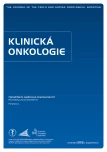-
Medical journals
- Career
Rhabdoid Tumours
Authors: P. Vasovčák; A. Puchmajerová; A. Křepelová
Authors‘ workplace: Ústav biologie a lékařské genetiky, Fakultní nemocnice v Motole, Praha
Published in: Klin Onkol 2012; 25(Supplementum): 27-29
Overview
Rhabdoid tumors (RT) are rare highly malignant tumors. They are part of the embryonic types of tumors and therefore occur in early childhood (between ages of 0–2 years). The most common locations are brain and kidney, but RTs arising usually from soft tissues have been reported widely at most anatomical sites in the body. These tumors are composed of rhabdoid cells alone or as a mixture with primitive neuroectodermal cells, mesenchymal cells and/or epithelial cells, commonly denoted as atypical teratoid/rhabdoid tumours (AT/RT). Based on extremely rare incidence and usually non-specific histological picture, molecular genetic studies are extremely helpful in confirming diagnosis of RT. Biallelic inactivation mutation of the SMARCB1 gene plays a crucial role in the pathogenesis of most RT. One third of mutations are germline mutations leading to the designation of the so-called rhabdoid predisposition syndrome. Molecular genetic analysis of the SMARCB1 gene might be beneficial in the establishment of correct diagnosis, genetic counselling and for epidemiologic studies.
Key words:
rhabdoid tumor – SMARCB1 – teratoid tumor
This study was supported by the project of the research organisation 00064203.
The authors declare they have no potential conflicts of interest concerning drugs, products, or services used in the study.
The Editorial board declares that the manuscript met the ICMJE “uniform requirements” for biomedical papers.Submitted:
26. 4. 2012Accepted:
25. 6. 2012
Sources
1. Eaton KW, Tooke LS, Wainwright LM et al. Spectrum of SMARCB1/INI1 mutations in familial and sporadic rhabdoid tumors. Pediatr Blood Cancer 2011; 56(1): 7–15.
2. Beckwith JB, Palmer NF. Histopathology and prognosis of Wilms tumors: results from the First National Wilms’ Tumor Study. Cancer 1978; 41(5): 1937–1948.
3. Rorke LB, Packer RJ, Biegel JA. Central nervous system atypical teratoid/rhabdoid tumors of infancy and childhood: definition of an entity. J Neurosurg 1996; 85(1): 56–65.
4. Biegel JA, Zhou JY, Rorke LB et al. Germ-line and acquired mutations of INI1 in atypical teratoid and rhabdoid tumors. Cancer Res 1999; 59(1): 74–79.
5. Sévenet N, Lellouch-Tubiana A, Schofield D et al. Spectrum of hSNF5/INI1 somatic mutations in human cancer and genotype-phenotype correlations. Hum Mol Genet 1999; 8(13): 2359–2368.
6. Reisman D, Glaros S, Thompson EA. The SWI/SNF complex and cancer. Oncogene 2009; 28(14): 1653–1668.
7. Kordes U, Gesk S, Frühwald MC et al. Clinical and molecular features in patients with atypical teratoid rhabdoid tumor or malignant rhabdoid tumor. Genes Chromosomes Cancer 2010; 49(2): 176–181.
8. Tomlinson GE, Breslow NE, Dome J et al. Rhabdoid tumor of the kidney in the National Wilms’ Tumor Study: age at diagnosis as a prognostic factor. J Clin Oncol 2005; 23(30): 7641–7645.
9. Sévenet N, Sheridan E, Amram D et al. Constitutional mutations of the hSNF5/INI1 gene predispose to a variety of cancers. Am J Hum Genet 1999; 65(5): 1342–1348.
10. Janson K, Nedzi LA, David O et al. Predisposition to atypical teratoid/rhabdoid tumor due to an inherited INI1 mutation. Pediatr Blood Cancer 2006; 47(3): 279–284.
11. Boyd C, Smith MJ, Kluwe L et al. Alterations in the SMARCB1 (INI1) tumor suppressor gene in familial schwannomatosis. Clin Genet 2008; 74(4): 358–366.
12. Hulsebos TJ, Plomp AS, Wolterman RA et al. Germline mutation of INI1/SMARCB1 in familial schwannomatosis. Am J Hum Genet 2007; 80(4): 805–810.
13. Swensen JJ, Keyser J, Coffin CM et al. Familial occurrence of schwannomas and malignant rhabdoid tumour associated with a duplication in SMARCB1. J Med Genet 2009; 46(1): 68–72.
14. Bourdeaut F, Lequin D, Brugières L et al. Frequent hSNF5/INI1 germline mutations in patients with rhabdoid tumor. Clin Cancer Res 2011; 17(1): 31–38.
15. Bacci C, Sestini R, Provenzano A et al. Schwannomatosis associated with multiple meningiomas due to a familial SMARCB1 mutation. Neurogenetics 2010; 11(1): 73–80.
16. Hadfield KD, Newman WG, Bowers NL et al. Molecular characterisation of SMARCB1 and NF2 in familial and sporadic schwannomatosis. J Med Genet 2008; 45(6): 332–339.
17. Teplick A, Kowalski M, Biegel JA et al. Educational paper: screening in cancer predisposition syndromes: guidelines for the general pediatrician. Eur J Pediatr 2011; 170(3): 285–294.
Labels
Paediatric clinical oncology Surgery Clinical oncology
Article was published inClinical Oncology

2012 Issue Supplementum-
All articles in this issue
- Juvenile Polyposis Syndrome
- Birt-Hogg-Dubé Syndrome
- Hereditary Pheochromocytoma and Paraganglioma
- Hereditary Leiomyomatosis and Renal Cell Cancer – HLRCC / / Multiple Cutaneous and Uterine Leimomyomatosis – MCUL
- The Clinical Importance of a Genetic Analysis of Moderate-Risk Cancer Susceptibility Genes in Breast and Other Cancer Patients from the Czech Republic
- Genetic Counselling in Male Carriers of BRCA1 and BRCA2 Gene Mutations
- The Effect of Prophylactic Mastectomy with Recontruction on Quality of Life in BRCA Positive Women
- Surgical Prevention of Breast Carcinoma in Patients with Hereditary Risk
- Preimplantation Genetic Diagnosis (PGD) of Hereditary Cancer Syndromes
- Evaluation of Variants of Unknown Significance in the BRCA2 gene
- Diagnostics of Breast Cancer in High-Risk Women – Our Own Experience
- Rhabdoid Tumours
- Hereditary Diffuse Gastric Cancer
- Constitutional Mismatch Repair-Deficiency Syndrome (CMMR-D) – a Case Report of a Family with Biallelic MSH6 Mutation
- Clinical Dysmorphic Syndromes with Tumorigenesis
- Li-Fraumeni Syndrome – a Proposal of Complex Prevention Care for Carriers of TP53 Mutation with Total-Body MRI
- Clinical Oncology
- Journal archive
- Current issue
- Online only
- About the journal
Most read in this issue- Birt-Hogg-Dubé Syndrome
- The Clinical Importance of a Genetic Analysis of Moderate-Risk Cancer Susceptibility Genes in Breast and Other Cancer Patients from the Czech Republic
- Hereditary Diffuse Gastric Cancer
- Clinical Dysmorphic Syndromes with Tumorigenesis
Login#ADS_BOTTOM_SCRIPTS#Forgotten passwordEnter the email address that you registered with. We will send you instructions on how to set a new password.
- Career

